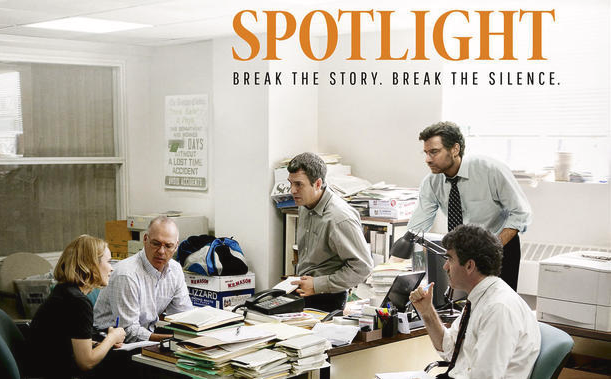In today’s increasingly hostile climate where the media’s credibility is frequently called in to question, it is important to remember the positive changes that journalists have helped to bring about. One of these positive changes is the revelation of sexual abuse committed against children at the hands of Catholic priests.
Back in 2001, Spotlight, the Boston Globe’s team of investigative journalists, wrote a series of Pulitzer Prize-winning articles. They covered the heinous crimes that had been committed by Catholic priests in and around Boston, Massachusetts and the subsequent cover ups by the Boston Archdiocese.
“Spotlight,” the film, was released in 2015 and focused on the efforts of these journalists to bring the story of abuse within the Catholic Church to light.
On Jan 29, “Spotlight” was shown in Dina’s Place as part of Winthrop University’s ongoing series “News Literacy and the Future of Journalism.” In addition to the screening of the film, a panel discussion was held following the conclusion of the film.
The panel consisted of Nathaniel Frederick, an associate professor of mass communication and Peter Judge, department chair of philosophy and religious studies. During the discussion, a range of issues were covered as the panelists fielded questions from the audience and addressed the issues of systemic sexual abuse that occur in religious organizations, the role of investigative journalists and the downsizing of newspaper staffs that has precipitated a decline in investigative journalism at local/regional levels.
Frederick described investigative journalists as a “luxury” for newspapers today and that investigative journalism has “not necessarily been a priority” in the wake of journalists undergoing mass layoffs.
The film features an all-star cast and was a hit among critics and audiences alike. “Spotlight” not only did well at the box office but went on to win Academy Awards for Best Picture and Best Original Screenplay.
The film makes heavy use of Catholic imagery and symbolism, which should come as no surprise to the viewer. Catholic church buildings appear in many scenes and much of the dialogue revolves around the Catholic Church and Catholicism as a whole. Boston has historically had a strong Catholic population. On one hand, this explains the abundance of Catholic Church buildings appearing in many of the scenes. On the other, this also appears to be a deliberate move on the part of the filmmakers.
Furthermore, Boston plays a large role in the history of the United States and has a rich history and a unique culture. This translates in many films that are set/filmed in Boston – particularly “The Departed,” “The Boondock Saints” and “Mystic River” – with the city itself becoming an inescapable character that permeates every aspect of the film.
One of the most interesting techniques used by the filmmakers are sequences or shots that are subtly jarring. One example of this is when one of the Spotlight journalists is conducting an interview with a childhood sexual abuse survivor. The camera follows the pair as they stroll along an outdoor path and the survivor details the abuse he endured. As the scene comes to an end, the camera pans to reveal a group of children playing just outside of a Catholic church building.
Another subtle plot device that jars the viewer was pointed out by Judge. During the panel discussion after the film, Judge mentioned a scene where a survivor recounts how the priest who abused him took him out for ice cream. The survivor said that he did not eat the ice cream but instead let it melt and run down his arm. As he finishes telling the story to the journalists, the camera pans to reveal track marks from IV drug use that now scar his arms.
While “Spotlight” addresses many issues within the Catholic Church, including the abuse committed by some priests and the vow of celibacy that priests take, it also brings up issues within the field of journalism. The film addresses the problems of one story taking precedence over another and of the difficulties of dealing with sources and getting quotes or interviews.
On a more important level, the film also addresses carelessness among journalists. In a particularly poignant scene toward the end of the film, the editor of the Spotlight division admits to his team that more than a decade earlier he had received a list of priests who were sexually violating children yet had declined to follow up on the story.
To provide a level of context for the film, Judge detailed the importance of the Catholic Church in cities such as Boston. Judge said that the church became a “focal point of support” for immigrants from Catholic countries such as Ireland, Poland, France and Italy.
“Oftentimes, Catholic immigrants had priests that spoke their own languages,” Judge said.
Judge reinforced a point that was made during the film where Catholic priests were seen, in a sense, as being God.
“The priest was seen as the presence of God in the neighborhood,” Judge said.
While describing priests showing up at the houses of children they targeted for abuse, Judge said, “You heard people in the film talk about it was like God coming to your house.”
While the film mostly dealt with religion, journalism played an equally important role. Frederick said that “Newspaper staff is down 40 percent since 2003” which has led to a death of investigative journalists in local and regional markets. Frederick described the process of investigative journalism as “tedious” and said that major stories, like the one in “Spotlight,” can takes months or years of work to finish. Frederick also stressed the importance of “hitting the streets” and making phone calls to find sources and obtain information.
While investigative journalism is disappearing from newspapers, Frederick said that there are “people who, as freelancers, do this kind of work”. He also made reference to the rights that citizens of the United States have, such as the right to submit requests under the Freedom of Information Act and to attend public meetings.
“That’s the reason why people can write these types of stories,” Frederick said.




